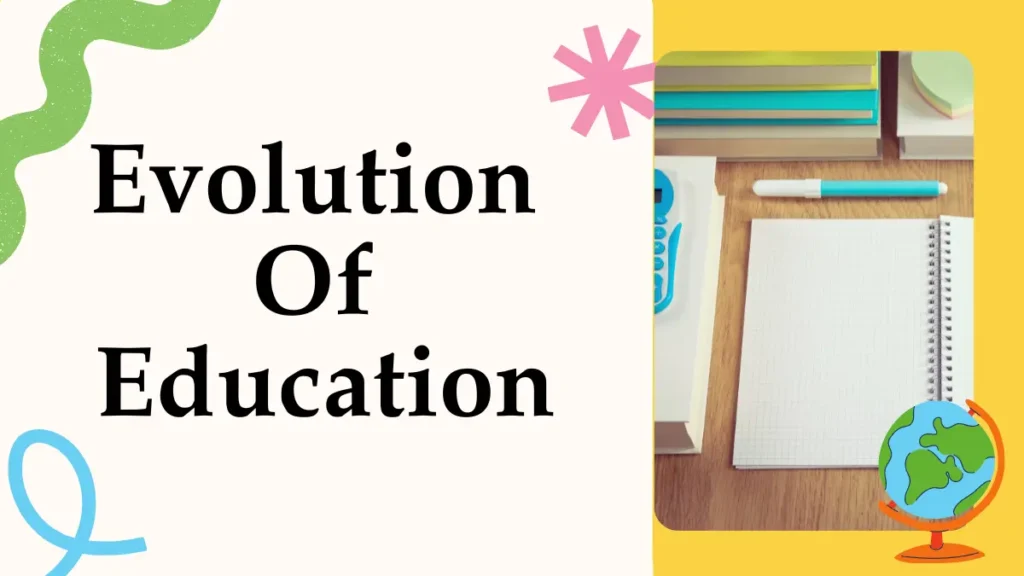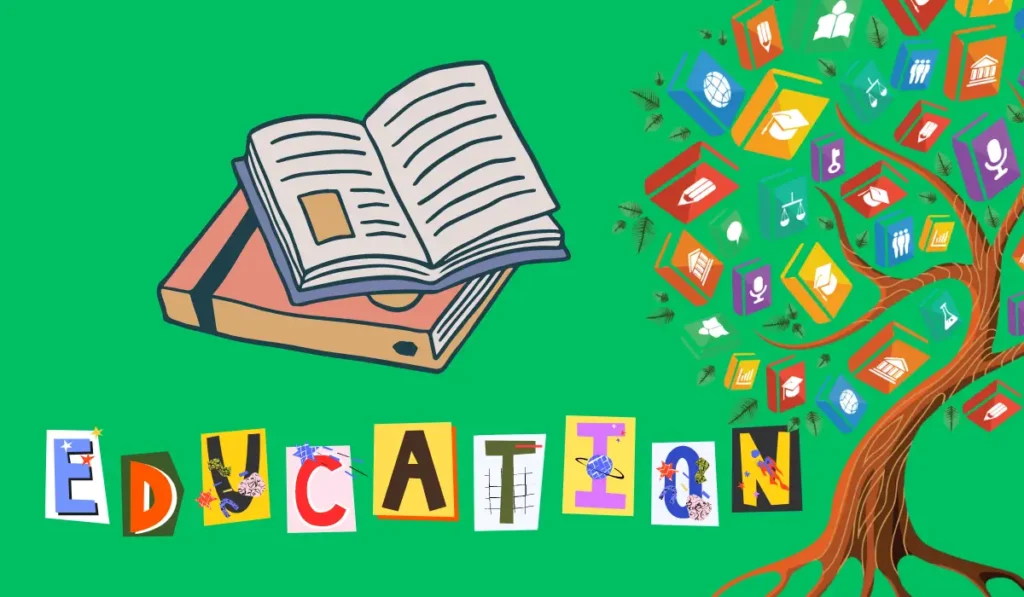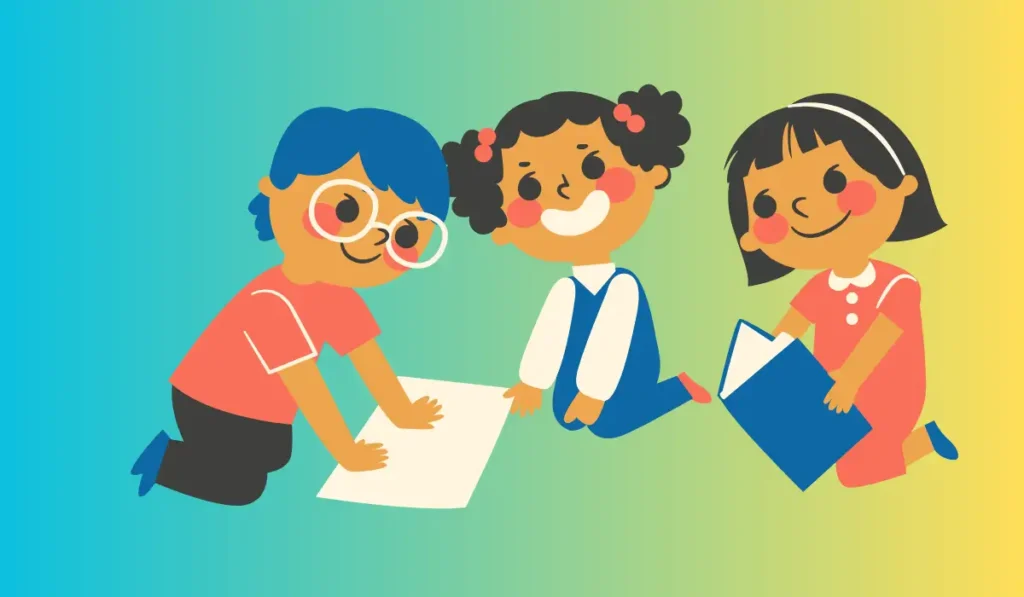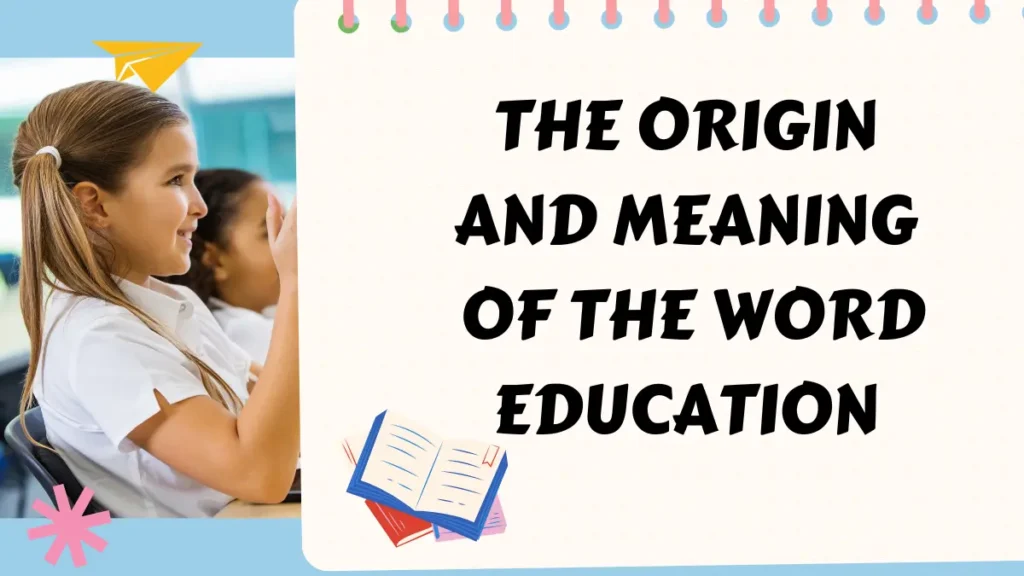Education comes from the Latin word “educare,” which means to bring up or to train. Its root word “duco” means to lead, to draw or to guide.
Education is a process that has been prevalent since ancient times. It encompasses implementing knowledge, skills, values, and beliefs into individuals. It is the medium through which individuals acquire knowledge, develop cognitive and practical skills, and build character.
In this article, I will explore the various aspects of education, including its importance, types, and evolution over the years.
The Historical Evolution Of Education
Education has come a long way since its earliest forms. The word “education” derives from the Latin word “educare,” which means “to bring up or raise. ” Throughout history, education has been used as a means to transmit knowledge, values, and skills to individuals.

The Earliest Forms Of Education
The earliest forms of education consisted of informal methods of passing down knowledge from one generation to the next. These methods were not structured or systematic, but rather informal and sporadic. Here are some key points to note:
- Parents pass down skills and knowledge to their children.
- Elders share wisdom and knowledge through storytelling, traditions, and ceremonies.
- Learning through apprenticeship.
Education In Ancient Civilizations
As civilizations developed, so did the methods of education. In ancient civilizations, education took on a more formal and structured approach. Here are some key points to note:
- In ancient Egypt, education was primarily for scribes, who were responsible for the administration and record-keeping of the state.
- In ancient Greece, education was focused on philosophy, the arts, and physical education. Schools called “academies” were established to teach a range of subjects.
- In ancient Rome, education was focused on law, administration, and engineering. Education was also used to indoctrinate children with patriotism.
The Emergence Of Formal Education
The emergence of formal education can be traced back to the Middle Ages. During this time, universities were established, and teachers began to organize subjects into a curriculum. Here are some key points to note:
- The first universities were established in the 12th century.
- The curriculum consisted of the trivium (grammar, logic, and rhetoric) and the quadrivium (arithmetic, music, geometry, and astronomy).
- Formal education was focused on theology and the humanities.
The Renaissance And The Rise Of Humanism
In the Renaissance, humanism emerged as a philosophy that emphasized the value and agency of human beings. This philosophy had a significant impact on education, as it shifted the focus from theology to the humanities. Here are some key points to note:
- Humanism emphasized the importance of classical literature, history, and languages.
- The printing press made books more accessible, and education began to spread beyond the elite.
- Science and mathematics became more important subjects of study.
Education In The Modern Era
Education in the modern era has gone through many changes, as societies have evolved and technology has advanced. Here are some key points to note:
- The development of mass education in the 19th century made education accessible to the masses.
- The rise of industrialization and technological advancements led to the development of vocational and technical education.
- Today, education is undergoing a digital transformation, with online learning and virtual classrooms becoming increasingly popular.
Education has evolved, from informal methods of passing down knowledge to formal education and beyond. As societies continue to change and evolve, education will continue to adapt to meet the needs of individuals and communities.

The Philosophy Of Education
Education is a word derived from the Latin word ‘educare’, which means to bring up. The philosophy of education encompasses the fundamental beliefs we hold about what education is, what it should be, and what it should achieve.
Let’s dive deeper into this topic.
Understanding Different Philosophies Of Education
Different philosophies of education shape how we approach teaching and learning. Here are some common ones:
- Essentialism: This philosophy emphasizes a back-to-basics approach that emphasizes fundamental knowledge and skills.
- Progressivism: Progressivism is child-centric, focusing on the interests, abilities, and needs of the individual learner.
- Perennialism: Perennialism emphasizes the study of classic works and ideas as a means to understand the world around us.
- Constructivism: This theory asserts that learners construct knowledge for themselves rather than receive it from external sources.
The Significance Of Philosophy In Education
Philosophy plays a crucial role in shaping the education system. It helps educators create a foundation for learning, providing them with a framework for developing curriculum and assessment strategies.
Without a clear and defined philosophy, the education system would lack direction and purpose.
Educational Theories And Their Implications
Educational theories influence how we design curricula, teach students, and assess their understanding. Here are some widely accepted educational theories:
- Behaviorism: This theory emphasizes observable behavior as a measure of learning and posits that rewards or punishments can shape behavior.
- Humanism: This theory views learners as individuals with unique needs and abilities and asserts that educators must address their students’ holistic development.
- Multiple intelligences: Howard Gardner’s theory proposes that learners possess multiple types of intelligence and asserts that education should provide all types of learners with opportunities to succeed.
- Sociocultural theory: This theory emphasizes the importance of the social and cultural context in shaping individual learning experiences.
Understanding the philosophy of education is crucial to creating an effective education system.

The Sociocultural Dynamics Of Education
Education is the process of imparting knowledge, skills, and values to individuals. Societies and cultures define education and use it to influence socialization, preserve traditions, and underpin economic development.
Here are a few ways sociocultural factors impact education:
How Societal And Cultural Factors Influence Education
Cultural factors have a profound impact on education. Here are some societal and cultural factors that affect education:
- Family background, economic status, and social class influence education.
- Educational policies and reforms reflect the cultural values at play in a given society.
- The attitudes and beliefs of teachers, students, and parents impact education.
- Gender, race, ethnicity, and religion can shape education practices.
The Role Of Education In Cultivating And Transmitting Cultural Values
Education plays a significant role in cultivating and transmitting cultural values. Here are some ways education can preserve cultural norms:
- Schools can offer courses in which students learn about their cultural heritage.
- Cultural events can be organized where students learn more about their traditions.
- Cultural exchange programs between schools can introduce students to new cultures and foster an appreciation for diversity.
Education And Social Stratification
Education can be used as a tool to perpetuate social stratification. Here are some ways social stratification occurs through education:
- Education can reinforce and perpetuate existing inequalities in society.
- Higher education is often seen as a means to access social mobility.
- Education policies can widen or narrow the gap between students from different social classes.
Education And Globalization
Globalization has had a profound impact on education. Here are some ways globalization has transformed education in recent years:
- Globalization has facilitated the spread of ideas, culture, and knowledge among different nations.
- Technology is transforming education by providing new ways of teaching and learning.
- Increasingly, education is seen as a means of creating a global workforce that can adapt to new economic realities.
The sociocultural dynamics of education are complex and constantly evolving. However, understanding how societal and cultural factors influence education is essential to improving education outcomes for everyone.
Education And The Current Technological Landscape
In today’s world, technology has revolutionized the way we live, work, and learn. Education, in particular, has been significantly impacted by technology, changing the way it is delivered, accessed, and consumed.
The Impact Of Technology On Education
Technology has had a profound impact on education. Here are some key points:
- Technology has made education more accessible, cost-effective and flexible, making it possible for anyone to access educational resources at any time.
- Technology has transformed the way teachers deliver instructions, making them interactive and engaging.
- Technology has enabled students to take an individualized approach to learning that caters to their unique learning styles and preferences.
- Technology has made it possible for educators to track student progress more efficiently, making it easier to identify any learning gaps.
The Integration Of Technology In Formal Education
Technology has become an integral part of formal education, transforming the way it is delivered and consumed. Here are some key points:
- Technology has made it possible for schools and universities to offer remote and online learning, giving students the flexibility to learn from anywhere in the world.
- The integration of technology in formal education enables teachers to use interactive and collaborative tools that make learning more engaging and effective.
- Technology has revolutionized the use of textbooks, which can now be accessed online, making it possible to update them and keep them current.
- Technology has made it possible for educators to personalize learning, catering to each student’s unique needs and preferences.
Distance Learning And E-Learning
Distance learning and e-learning have become increasingly popular, thanks to technology. Here are some key points:
- Distance learning and e-learning have made education accessible to those who can’t attend traditional classrooms, such as working professionals or people living in remote areas.
- E-learning platforms offer a wide range of courses, making it possible for students to learn anything they want, regardless of where they are.
- E-learning platforms enable students to learn at their own pace, making it possible to speed up or slow down the learning process as needed.
The Future Of Education Technology
The future of education technology looks promising, with many exciting developments. Here are some key points:
- Artificial intelligence, virtual, and augmented reality are already being integrated into education, making it possible to create immersive and engaging learning experiences.
- Wearable technology, such as smartwatches, enables educators to monitor students’ physical activity levels, which have a significant impact on learning outcomes.
- Cloud computing is transforming the way educational institutions store and access data, making it possible to share resources and collaborate more efficiently.
Technology has transformed education, making it more accessible, flexible, and engaging. As technology continues to evolve, we can expect to see many exciting developments in the field of education technology.
Frequently Asked Questions
What Is The Origin Of The Word Education?
Education comes from the Latin word “educare” which means to “bring up, nurture”. It evolved into the old French word “education” and then into middle English as “educacioun”. The definition expanded to include the cultivation of the mind and faculties.
What Is The Meaning Of Education?
Education is a process of learning that involves the acquisition of knowledge, skills, values, beliefs, and habits. It is not limited to formal schooling but rather encompasses a lifelong pursuit of learning and personal growth.
Why Is Education Important In Society?
Education is important in the society because it empowers individuals with the knowledge and skills needed to pursue their aspirations. It also helps in reducing poverty, alleviating social inequality, and promoting economic growth.
How Has The Meaning Of Education Evolved?
The meaning of education has evolved from a narrow focus on classical studies for the elite to a broader perspective that includes vocational training and educating the masses.
Conclusion
As we explored the origin and meaning of the word education, we learned that it comes from the Latin word “educere” meaning “to lead out. ” Education is more than just acquiring knowledge or information; it’s about developing critical thinking, skills, and values to become a responsible and contributing member of society. Throughout history, various philosophers and educators have contributed to shaping our current understanding of education. Despite the different perspectives on education, one thing remains constant; education is an essential tool for personal and societal growth.


